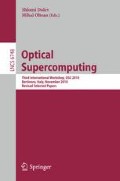Abstract
Optical computing has a seemingly eternal problem. It always appears to be in competition with electronic computing. Moore’s law and the advantages of digital over analog processing make pure electronics superior in almost every case. Optical computing uses come when the signal is already in the optical domain or when it is used to reduce the heat load in hybrid optical-electronic chips. I describe here work done with a number of bright opticists and logicians over the last four years that produces using optics logic that dissipates no energy and accommodates whatever bandwidth the input and output laser modulation affords. Moreover, we can show why electronics alone can never accomplish those important properties.
Access this chapter
Tax calculation will be finalised at checkout
Purchases are for personal use only
Preview
Unable to display preview. Download preview PDF.
References
Caulfield, H.J., Vikram, C., Zavalin, A.: Optical Logic Redux, Optik. International Journal for Light and Electron Optics 117, 199–209 (2006)
Shamir, J.: Optics in computing, - 40 year later, Critical Technologies for the Future of Computing. In: Proc. SPIE, San Diego, July 30 - August 4, vol. 4109, pp. 4109–4115 (2000)
Shamir, J.: Optical computing remains in shadow, EETimes (1122) (July 17, 2000), http://www.techweb.com/se/directlink.cgi?EET20000717S0072
Landauer, R.: Irreversibility and heat generation in the computing process. IBM Journal of Research and Development 5, 183–191 (1961)
Bennett, C.H.: Logical reversibility of computation. IBM Journal of Research and Development 17, 525–532 (1973)
Bennett, C.H.: The Thermodynamics of Computation – A Review. International Journal of Theoretical Physics 21, 905–940 (1982)
Fredkin, E., Toffoli, T.: Conservative logic. International Journal of Theoretical Physics 21(3-4), 219–253 (1982)
Perkowski, M.: Bibliography of reversible and quantum logic and computing, http://web.cecs.pdx.edu/~mperkows/PQLG/biblio.html
Feynman, R.: Quantum mechanical computers. Optics News 11, 11–20 (1985)
Shamir, J., Caulfield, H.J., Miceli, W., Seymour, R.J.: Optical Computing and the Fredkin Gates. Appl. Opt. 25, 1604–1607 (1986)
Caulfield, H.J., Soref, R.A., Qian, L., Zavalin, A., Hardy, J.: Generalized Optical Logic Elements – GOLEs. Optics Communications 271, 365–376 (2007)
Caulfield, H.J., Soref, R.A., Vikram, C.S.: Universal reconfigurable optical logic with silicon-on-insulator resonant structures. Photonics and Nanostructures 5, 14–20 (2007)
Hardy, J., Shamir, J.: Optics inspired logic architecture. Optics Express 1(5), 150–165 (2007)
Peres, A.: Reversible logic and quantum computers. Physical Review A 32, 3266–3276 (1985)
Author information
Authors and Affiliations
Editor information
Editors and Affiliations
Rights and permissions
Copyright information
© 2011 Springer-Verlag Berlin Heidelberg
About this paper
Cite this paper
Caulfield, H.J. (2011). Optics Goes Where No Electronics Can Go: Zero-Energy-Dissipation Logic. In: Dolev, S., Oltean, M. (eds) Optical Supercomputing. OSC 2010. Lecture Notes in Computer Science, vol 6748. Springer, Berlin, Heidelberg. https://doi.org/10.1007/978-3-642-22494-2_9
Download citation
DOI: https://doi.org/10.1007/978-3-642-22494-2_9
Publisher Name: Springer, Berlin, Heidelberg
Print ISBN: 978-3-642-22493-5
Online ISBN: 978-3-642-22494-2
eBook Packages: Computer ScienceComputer Science (R0)

